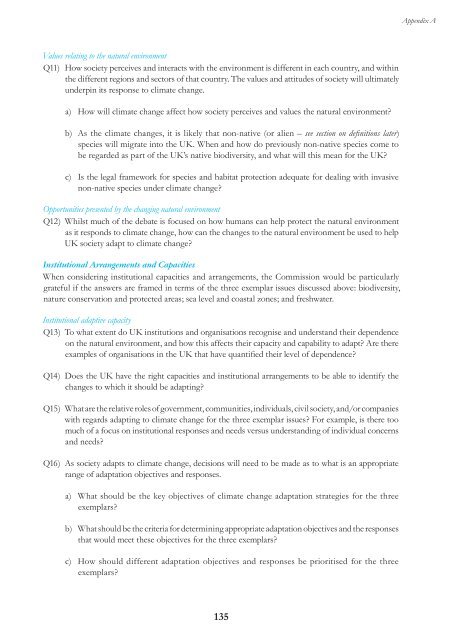Twenty-eighth Report Adapting Institutions to Climate Change Cm ...
Twenty-eighth Report Adapting Institutions to Climate Change Cm ...
Twenty-eighth Report Adapting Institutions to Climate Change Cm ...
Create successful ePaper yourself
Turn your PDF publications into a flip-book with our unique Google optimized e-Paper software.
Values relating <strong>to</strong> the natural environment<br />
Q11) How society perceives and interacts with the environment is different in each country, and within<br />
the different regions and sec<strong>to</strong>rs of that country. The values and attitudes of society will ultimately<br />
underpin its response <strong>to</strong> climate change.<br />
a) How will climate change affect how society perceives and values the natural environment?<br />
b) As the climate changes, it is likely that non-native (or alien – see section on definitions later)<br />
species will migrate in<strong>to</strong> the UK. When and how do previously non-native species come <strong>to</strong><br />
be regarded as part of the UK’s native biodiversity, and what will this mean for the UK?<br />
c) Is the legal framework for species and habitat protection adequate for dealing with invasive<br />
non-native species under climate change?<br />
Opportunities presented by the changing natural environment<br />
Q12) Whilst much of the debate is focused on how humans can help protect the natural environment<br />
as it responds <strong>to</strong> climate change, how can the changes <strong>to</strong> the natural environment be used <strong>to</strong> help<br />
UK society adapt <strong>to</strong> climate change?<br />
Institutional Arrangements and Capacities<br />
When considering institutional capacities and arrangements, the Commission would be particularly<br />
grateful if the answers are framed in terms of the three exemplar issues discussed above: biodiversity,<br />
nature conservation and protected areas; sea level and coastal zones; and freshwater.<br />
Institutional adaptive capacity<br />
Q13) To what extent do UK institutions and organisations recognise and understand their dependence<br />
on the natural environment, and how this affects their capacity and capability <strong>to</strong> adapt? Are there<br />
examples of organisations in the UK that have quantified their level of dependence?<br />
Q14) Does the UK have the right capacities and institutional arrangements <strong>to</strong> be able <strong>to</strong> identify the<br />
changes <strong>to</strong> which it should be adapting?<br />
Q15) What are the relative roles of government, communities, individuals, civil society, and/or companies<br />
with regards adapting <strong>to</strong> climate change for the three exemplar issues? For example, is there <strong>to</strong>o<br />
much of a focus on institutional responses and needs versus understanding of individual concerns<br />
and needs?<br />
Q16) As society adapts <strong>to</strong> climate change, decisions will need <strong>to</strong> be made as <strong>to</strong> what is an appropriate<br />
range of adaptation objectives and responses.<br />
a) What should be the key objectives of climate change adaptation strategies for the three<br />
exemplars?<br />
b) What should be the criteria for determining appropriate adaptation objectives and the responses<br />
that would meet these objectives for the three exemplars?<br />
c) How should different adaptation objectives and responses be prioritised for the three<br />
exemplars?<br />
135<br />
Appendix A
















